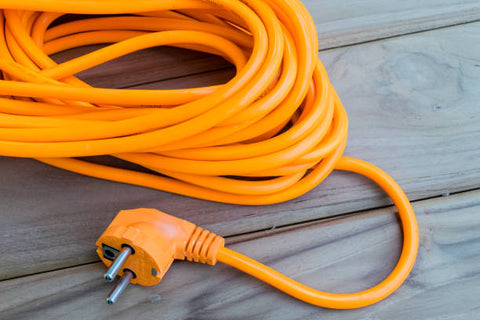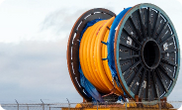A Full Guide to Types of Extension Cords: Gauge, Applications, Length
Extension cords are an interesting breed among all wires and cables- they are not regular power cables per se, but most of us still use them at home almost daily. Selecting the correct type of extension cable for your appliances is important because of safety concerns associated with this type of cable. Read this guide to choose the best extension cord for you.

What is an Extension Cord?
An extension cord is a power cable with enhanced flexibility that has a plug on one hand and a group of sockets on the other hand for the same type of plugs. Extension cords differ by size, gauge, construction, and type of use.
Extension Cord vs. Regular Electric Cable
Unlike regular electric cables, extension cords are only designed for temporary use because of safety concerns. The reason why extension cords are dangerous is because they are not manufactured specifically for the specific load of the electrical circuit and the specific electrical current. Therefore, there is always a potential for overloading. The use of extension cords is regulated by the National Electric Code and UL Underwriter Laboratories standards.
Uses Of Extension Cords
Extension cords are used for a limited time to:
- Power devices and gadgets
- Plug in devices such as television, speaker, etc
- Plug in several devices at the same time
Types Of Extension Cords By Applications: Light-Duty, Medium-Duty, Heavy-Duty
Depending on which applications are allowed, extension cords can be divided into light-duty, regular-duty, and heavy-duty.
Applications of Light-Duty Extension Cords
Light-duty extension cords are the most primitive form of the extension cord that is not designated for many applications. This is also the cheapest type of extension cord. These cables usually have no grounding wire, making safety concerns associated with them more prominent. When it comes to the letter code used with this subtype of extension cord, it is more often the letter S that signals the cable is intended for general use.
Light-duty extension cords bear a resemblance to lamp wire cords used in lighting. The light-duty extension cords are not allowed for anything else other than the light-duty service. In particular, they are banned from using the heating equipment. Some of the appliances that are banned from use with the extension cord are irons, space heaters, boilers, and furnaces.
Light-duty extension cables are used with light-duty equipment, such as lamps, clocks, chargers, and others, with an ampacity no bigger than 7 Amps.
Gauges of Light-Duty Extension Cords
Common sizes of light-duty extension cords are 18 AWG, 16 AWG, and 14 AWG. The choice of gauge depends on how long the cable is expected to run. The smaller the length, the higher the gauge number. If the cord is up to 25 feet long, choose 18 AWG wire. For lengths up to 50 feet, 16 AWG is a preferable gauge. Finally, the length of 100 feet means that 14 AWG should be used.
Applications of Medium-Duty Extension Cords
Regular-duty extension cords are made from similar materials as light extension cords, but they have a grounding conductor that makes them safer in a variety of circumstances for 10 Amps and under. They are usually used with standard devices such as television, speakers, computers, media players, etc. However, they are not allowed for heavy-duty appliances.
Gauges of Medium-Duty Extension Cords
Medium-duty extension cords are allowed in 16 AWG to 12 AWG. The 16 AWG version is for cords up to 25 feet, the 14 AWG version is for cords up to 50 feet, and the 12 AWG is up to 100 feet.
Applications of Heavy-Duty Extension Cords
Heavy-duty extension cords are for heavy-duty appliances, including space heaters and other types of heaters. The ampacity of these cables is up to 15 Amps. They are available in sizes between 14 AWG and 10 AWG. 14 AWG is for 25-feet length, 12 AWG is for 50-feet cords, and 10 AWG is for 100-feet cords.
Reading Letter Codes Of Extensive Cords
S: General - Use Extension Cords
The letter S indicates that the extension cord is indicated for general use without any specific characteristics. If no other letters are present, this extension cord is not acceptable for outdoor use and is not resistant to oil. General extension cords are usually not ranked for heavy-duty use.
W: Rated for Outdoor Use
W indicates that the extension cord is weather-resistant, making it acceptable for outdoor use. The insulation of such extension cords protects the cables from moisture.
J: 300 Voltage Insulation
The letter J, which usually means junior when it comes to electrical cables, means that the insulation of an extension cord is ranked 300 volts. This extension cord is used for lower-voltage applications not exceeding 300 volts.
T: Vinyl Thermoplastic Jacket
The letter T means that the extension cord has a jacket made of vinyl thermoplastic.
P: Parallel Wire Construction
The parallel wire construction, as indicated by the letter P, is optimal for air conditioners and household extension cords. It is created by binding together several extension wires.
O: Oil-Resistant
Oil-resistant extension cords can be used in environments where fuel and fertilizers can come in contact with the cable. The letter "O" only means oil-resistant and should not be confused for outdoors, even though oil-resistant extension cords can also be ranked for outdoor use with the letter W.
E: Made from TPE
The extension cord with the letter E has a jacket made from TPE, thermoplastic elastomer. This is the most durable type of material often used in heavy-duty cords.
Can You Bury An Extension Cord? Do Underground Extension Cord Exist?
One thing that every buyer of the extension cord has to know is that underground extension cords are not a thing, as extension cords are not in any way rated for direct burial. Burying extension cords is dangerous for life and a serious fire hazard. Moreover, extension cords will not be able to function properly underground. The cable that is ranked for underground use in the United States is UF-B cable. Use it for underground applications instead of hazardous and ineffective extension cords. Burying extension cords in conduit is just as dangerous and ineffective as direct burial.


















